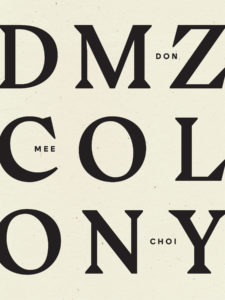I grew up in South Korea during the US-backed military dictatorship. I was born a year after General Park Chung Hee led a military coup and came into power. My father filmed the day of martial-law declaration in front of Seoul City Hall. Back then, he worked as a freelance photojournalist for UPI. The saluting lieutenant general is one of Park’s collaborators. The man in the background below the window, holding a small camera in front of his face, is most likely a police or intelligence officer. My father is at the bottom left, holding his film camera. After the parade, my father was briefly taken into the building where he stood face-to-face with Park. My father said that he was not afraid. He said he wasn’t afraid of Syngman Rhee, the previous dictatorial president, either. He wasn’t afraid of anything then, he said; instead, he complained to Park about the censorship of the news. That day his film made it out of Kimpo Airport to Tokyo, and his news footage appeared worldwide. Because I was an infant, I have no memory of this infamous day except through my father’s memory. Memory’s memory. Memory’s child. My memory lives inside my father’s camera, the site where my memory was born, where my retina and my father’s overlap. When I was old enough, I always accompanied my mother to the airport to greet my father, who returned home every three to five months from Vietnam. Overlapping memory always longs for return, the return of memory.
*
What I remember about my childhood are the children, no older than I, who used to come around late afternoons begging for leftovers, even food that had gone sour. The drills at school in preparation for attacks by North Korea kept me anxious at night. I feared separation from my family due to the ever-pending war. I feared what my mother feared—my brother being swept up in protests and getting arrested and tortured. Our radio was turned off at night in case we were suspected of being North Korean sympathizers. At school, former North Korean spies came to give talks on the evil leader of North Korea. I stood at bus stops to see if I could spot any North Korean spies, but all I could spot were American GIs. My friends and I waved to them and called them Hellos. In our little courtyard, I skipped rope and played house with my paper dolls among big, glazed jars of fermented veggies and spicy, pungent pastes. I feared the shadows they cast along the path to the outhouse. Stories of abandoned infant girls always piqued my interest, so I imagined that the abandoned babies might be inside the jars. Whenever I obeyed the shadows, I saw tiny, floating arms covered in mold. And whenever it snowed, I made tiny snowmen on the lids of the jars. Like rats, children can be happy in darkness. But the biggest darkness of all was the midnight curfew. I didn’t know the curfew was a curfew till my family escaped from it in 1972 and landed in Hong Kong. That’s how big the darkness was.
*
In 1980, my father filmed the rising waves of student protests against the dictatorship in Seoul. He also witnessed the brutal military crackdown on the pro-democratic uprising in Gwangju. He believed then that the dictatorship would never end and that it would be too dangerous for us to return home. He sold one of his cameras to pay for surgery when my older brother was injured during his mandatory military service. He gave the South Korean government news footage of a student protest in downtown Seoul he had filmed—from far away, from a rooftop—in exchange for the release of my injured brother from the military and a permit to leave South Korea. He believed that he was saving us from a life of perpetual darkness. In 1983, my family scattered all over, as my mother said. My parents and my younger brother headed to West Germany. My sister remained in Hong Kong, my older brother left for Australia, and I went to the US as a foreign student to complete my degrees in art. In light, we all were ailing from separation and homesickness. In light, we had to find a way to settle down, as my mother said. In light, we lived like birds.
*
In December 2016, I returned to South Korea. I returned in the guise of a translator, which is to say, I returned as a foreigner. And as a foreigner, I was invisible to most. I flittered about in downtown Seoul searching for my child self that had been left behind long ago. As a foreigner, I understood only the language of wings—the wings on totem animals on old palaces where I used to run around and play. The traditional tiled roofs I grew up beneath had grown wings, as had the mountain peaks behind Gwanghwamun Square. They no longer recognized me in a crowd of other foreigners—tourists, rather. Nevertheless, I went on searching for more wings, my language of return.
__________________________________

From DMZ Colony by Don Mee Choi. Used with the permission of the author and Wave Books. Copyright © 2020 by Don Mee Choi.



